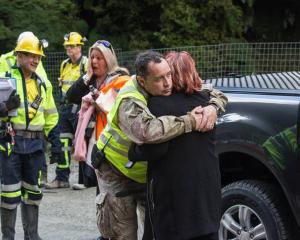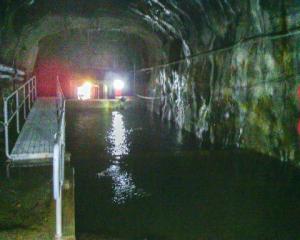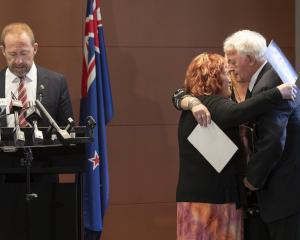The Pike River Coal chief, a man who has spent much of the past 30 years underground, has been thrust into the spotlight to deal with this crisis.
Tears have slipped down his cheeks many times in the past five days, and while it has been reported he is suffering from an eye infection, one could forgive him for feeling a little emotional.
Most of the 29 men still inside the mine are his colleagues and friends. He hired most of them while he was manager of Pike River, and over the five years he managed the mine, he grew to know many of them, and their families. Some of the men are his close friends.
The Whittall family moved from Greymouth to Wellington in September, as Mr Whittall (47) took on the role of chief executive, but since then he has spent a couple of days every week in Greymouth and at the mine site, 48km up the road.
And less than two months after taking over the position, he is back full-time, for the worst of reasons.
If anyone understands running coal mines, it is this man.
Mr Whittall has 30 years' experience in the underground mining industry, mostly in Australia, working his way up, to managerial positions at the Dendobium, Tower and Appin coal mines, in New South Wales.
He has a bachelor of engineering (mining) degree and a masters of business administration, both from the University of Wollongong.
When he was Pike River mine manager, he was responsible for on-site construction, mine development and recruitment of the workforce, and was closely involved with the company's recent capital raisings.
People who work with him, or have dealt with him during this disaster, say he is a good boss, one of the all-round good guys and have commended him for his communication skills.
So far, he has refused to speculate on the welfare of the men still in the mine, or give up hope they are alive.
"You don't work in mining unless you're an optimist. I have to keep believing that there's every chance they are alive."
He has been consistently courteous, good humoured, sensible and patient at media conferences, where he faces twice daily relentless questioning from up to 100 reporters.
His focus has remained completely on the men and their families, and he spends most of his time with the men's families.
And he is not alone in this. At the weekend, his own family arrived in Greymouth to be by his side, his children returning to their old school on Monday.
He has given few individual media interviews, but on Monday he told TV3 it felt like he was in a dream.
"I just keep thinking I can't be living through this. But if I am living through this, so are those families ...
"All I can do is reassure them of what [the mines rescue team is] trying to do to get their sons, brothers and fathers out of the mine."
That was his role in this situation, he said.
"That's what I can be, a conduit of truth and information.
"What sustains my hope is that two men survived that blast, that we still have a compressed air line going underground.
"There might not be 29 people, but however many there is, they're the ones I need to rescue. They're the ones I need to see."











